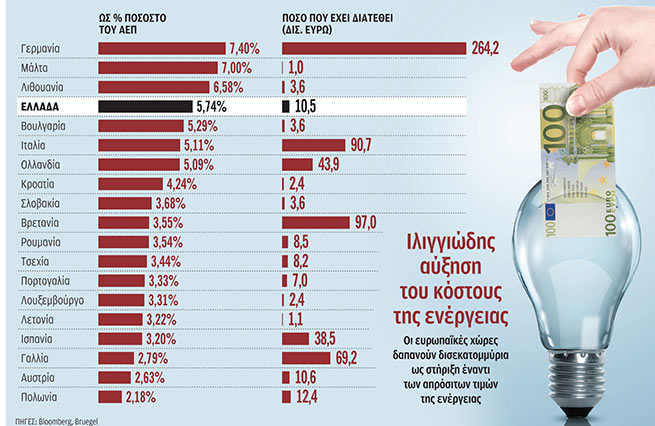The cost of the energy crisis in Europe overcame the barrier of 700 billion euros and now reaches 705 billion euros.
To support their economies hit by the energy crisis, the countries of the “Old World” have spent over the past 15 months the equivalent of the funds they pledged to support them in the midst of a pandemic downturn. And winter is just beginning. First in terms of losses, of course, once rich Germany. In other words, this is an unbearable burden for the European economy, which has already spent a staggering amount of more than 700 billion euros to ensure the security of energy supply and support businesses and households from rising prices.
Meanwhile, the increase in the total cost of overcoming the energy crisis indicates that countries are stepping up their actions in the face of a sharp drop in temperature. According to the Brussels-based think tank and economic institute Bruegel, countries in the European Union, from September 2021 to the present, have committed and allocated about 600 billion euros in support measures to protect consumers from rising costs. The corresponding amount last month was 50 billion euros less, which means that in the last month of the country EU spent another 50 billion euros. In addition, measures taken by non-EU countries – the UK and Norway – add 105 billion euros to this amount. The latest data is expected to increase pressure on the EU to finally agree on a gas price cap before Christmas.
According to the space technology and earth observation company Maxar, “unusually cold” temperatures are expected in the northern part of the continent next week.
The spending is almost equivalent to the landmark EU general bond program introduced to help European economies cope with the recession caused by the coronavirus pandemic. Brueghel recommends that the EU set up an energy crisis fund to help fight it and balance the potential impact on European economies.
As Simone Tagliapietra, one of the authors of the report, noted, “Energy prices in Europe are expected to remain high for a long time and concerns about fiscal sustainability will intensify. Inevitably, governments will come under increasing pressure to limit the support they offer families and businesses, targeted measures.” She also emphasizes that “the risk of fragmentation of the European market becomes more tangible if financially stronger countries provide more support to their industries than others.” Moreover, as can be seen from the table, Germany provided the most both in absolute terms and as a percentage of its GDP, which worried its EU partners. Italy accounts for most of the increase in related spending compared to last month. New Georgia Prime Minister Meloni’s government is allocating two-thirds of next year’s €30 billion budget to help families and businesses struggling with high energy prices.
These funds add to the almost 75 billion euros already spent to support the economy, with the bulk of it directed towards relief measures. These include tax breaks for businesses and families, and tax cuts to lower gasoline prices.
This month, energy ministers are due to hold the latest in a series of emergency meetings in an attempt to agree on a package of measures to limit the impact of high gas prices. But the package was put on hold as countries tried to resolve their deep differences over the cap. Poland, for example, will not agree to a price of more than $30 a barrel, and Cyprus, Malta and Greece want to be compensated for the shipping business they will lose due to the restrictions.
At the same time, countries are seeking to agree on a cap on the price of Russian oil in order to limit Moscow’s revenues. We are talking about $60 per barrel of Ural oil at the current price of $51.







More Stories
Greece: growth in deposits from households and businesses in March 2024
How much will it cost a Greek family to celebrate Easter?
EU employment record: Greece "stuck" in a low position